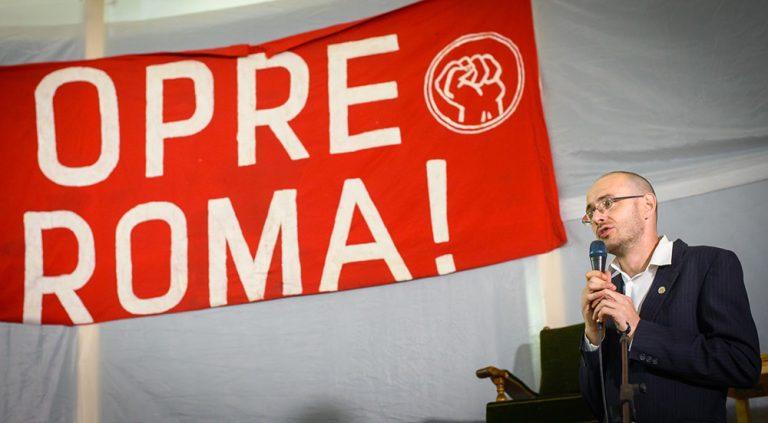Commentary: Activism by Romani people in the Czech Republic has a high cost, older activists are passing away without a younger generation in place

The recent and sudden death of Mr. Čeněk Růžička, the most significant human rights activist of Romani origin in the Czech Republic, has heavily impacted the domestic Roma and pro-Roma human rights movement and opened up many burning questions about the future of such activism here.
Activism by, for or with Romani people in the Czech environment has a high cost
The word “activist” is from the Latin activus, which means “active” or “operative”. The encyclopedic definition of the term explains that activists do their best to achieve an aim or a reform, based on their personal convictions, and that they genuinely believe in the cause for which they fight.
Activists never anticipate any acknowledgment, popularity, remuneration or salary for engaging in the fight of which they are convinced. Human rights activism in general and activism by, for or with Romani people has a high cost in the Czech environment, it does not come free of charge.
This is because activists express themselves loudly and publicly about matters that others hesitate to criticize or give their opinions about because they fear the consequences of their openness and sincerity. Activists invest their energy, their time, and frequently also their own finances in the activities and operations that do not generate any benefit for them personally beyond a good feeling – and often, exactly the opposite kind of feeling.
This means activists usually have to cope with the fact that their activism has a negative influence on their family life, because the energy, money and time they spend on activism costs their families. Activism has a baleful impact on activists’ working careers – very few employers want employees who will be critical and more loyal to their personal convictions than to the company for which they work.
This is connected to another negative impact of activism on the lives of people who dedicate themselves to it, the poverty into which most activists fall after some time. Activists frequently describe the poverty they face with their families as voluntary humility, or a lack of attachment to material things.
Bills, food, children’s after-school activities and similar necessary expenses have to be paid by all of us, so such lack of attachment isn’t really the case at all. Another negative outcome of activism, whether by allies who are pro-Roma or by Romani people themselves, is that the activists become targets of hate on the Internet and in real life.
Hatred and threats by antigypsyists are an integral part of the lives of human rights activists and their families. Activism hurts.
To dedicate oneself long-term to human rights activism by, for or with Romani people in the conditions of the Czech Republic brings one to the edge of self-sacrifice and sometimes over the edge, as the case of the late Mr. Čeněk Růžička has just demonstrated to us.
Older activists are passing away without a younger generation in place
Mr. Růžička’s unexpected passing has sparked a discussion about the future in the small, weak community of activists who are allies (pro-Roma) or Romani. There is nobody to replace him.
In the Czech Republic, these activists are mostly of an advanced age and frequently are pensioners. They began dedicating themselves to activism in middle age or old age.
The author of this piece represents a certain exception – at the age of 43, I am the youngest (sic!) member of this activist community. Because of their advanced age, the rest of the activists are passing away.
Nobody is here to replace them. There are no young pro-Romani allies or activists of Romani origin in the Czech Republic.
There are a couple of younger people who have dedicated themselves to activism in the short term, appearing in the movement and then quickly disappearing, not going the distance, not shouldering the burden. We have not managed to raise a new generation of activists.
This is our failure. There may be no younger generation of activists because human rights organizations are not supported in the Czech Republic, not the kind that could serve to cultivate and train future activists.
Education about human rights and defending them is not functioning here, to say nothing of education of this kind that would be focused on the Romani community. We dozens and maybe hundreds of organizations providing Romani people social services, but we do not have any collectives, or any organizations, that would dedicate themselves to advocating for and defending the human rights of Romani people (honor to the rare exceptions) – this critique of the state of the human rights of Romani people and their defence is mostly undesirable in this country, perceived as problem, not as something positive and not at all as an opportunity for change and reform.
A basic task lies before the remaining allies who are pro-Roma and activists of Romani origin who remain in the field here, that of figuring out how to share their hard-won experience, and with whom. Given that the integration of Romani people is failing in the Czech Republic and Czech social integration policy is ideologically stuck in the 20th century and uses dysfunctional instruments, the situations of Romani communities continue to deteriorate, their exclusion and poverty intensify, so there is an ocean of work ahead of us and we will need a new generation of activists.